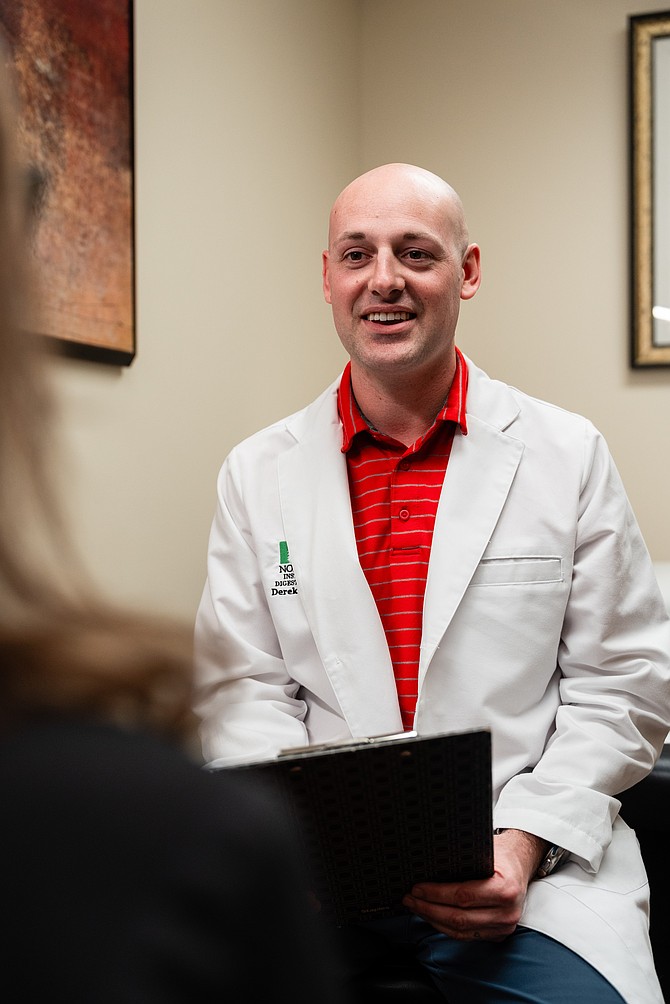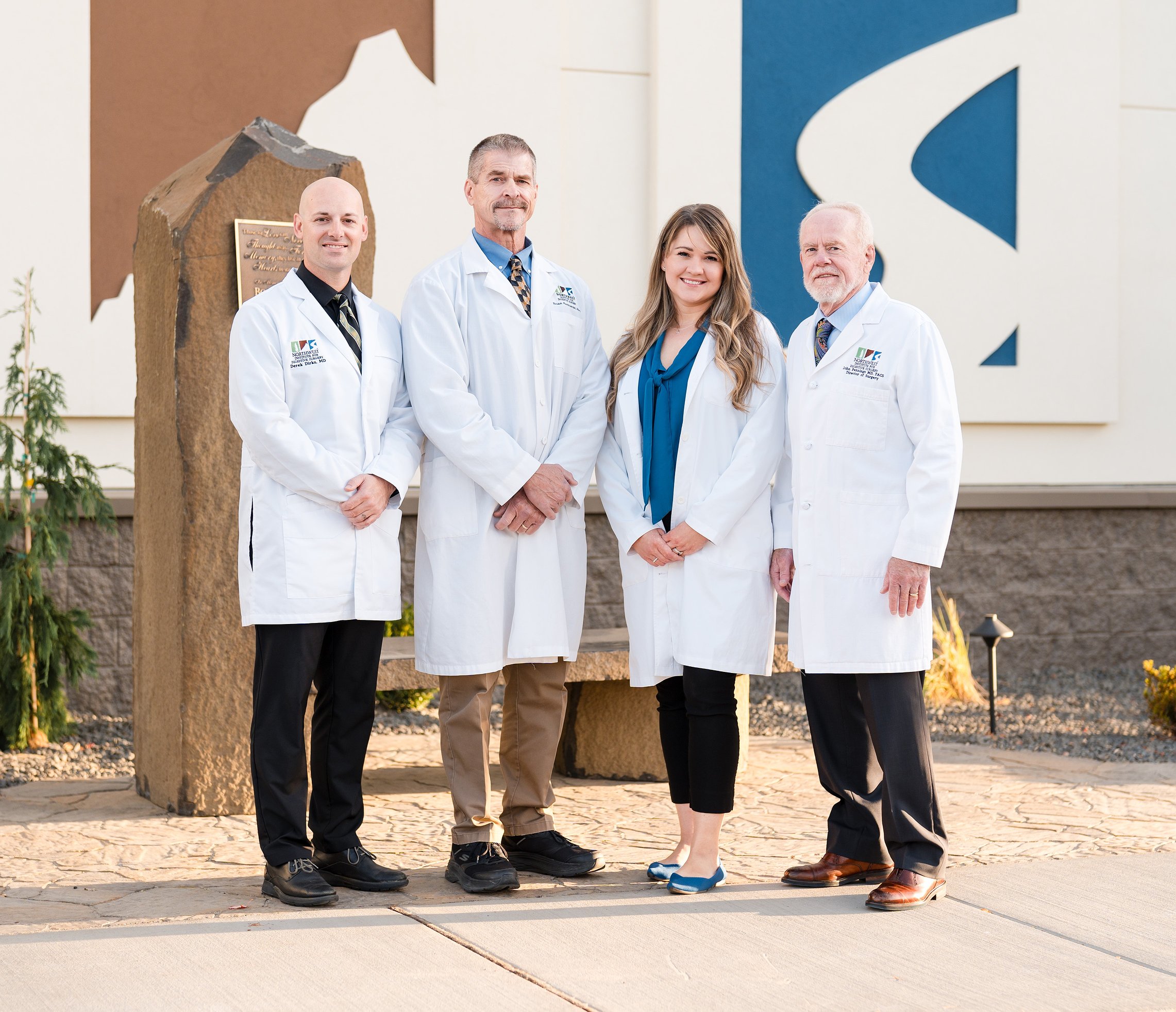Physician feature: Dr. Derek Dirks

Dr. Derek Dirks is a general surgeon and the director of bariatric surgery at Northwest Specialty Hospital in Post Falls.
Dr. Derek Dirks is a general surgeon and the director of bariatric surgery at Northwest Specialty Hospital in Post Falls.
A 2005 Coeur d'Alene High School graduate, Dirks attended the University of Idaho where he graduated with his Bachelor of Science in biology in 2009. He graduated from medical school at the Roy J. and Lucille A. College of Medicine at the University of Iowa in Iowa City in 2014, completed general surgery residency at the University of South Dakota General Surgery Residency program in Sioux Falls, S.D. in 2019 and completed bariatric surgery fellowship program at Legacy Good Samaritan in Portland.
He has been with Northwest Specialty Hospital for five years.
• How old were you when you realized you wanted to go into medicine, and what were some of your deciding factors?
"I grew up around medicine — my dad, Dr. Bret Dirks, began his neurosurgery practice in Coeur d’Alene in 1994. But despite that, I didn’t initially see myself following the same path. It wasn’t until I joined him on a medical mission trip to Honduras with Lake City Church that something shifted. Seeing firsthand the impact that medicine can have on people’s lives — especially in underserved areas — gave me a whole new perspective. After that, I began shadowing local physicians and worked as an orderly in the ORs at Northwest Specialty Hospital to gain more hands-on exposure. That experience solidified my decision to pursue a career in medicine."
• What do you most look forward to when you go to the office every day?
"What I look forward to most is being in the operating room. I’ve always felt that surgery is one of the most direct and impactful ways a doctor can improve a patient’s health. Whether it’s a straightforward procedure like a laparoscopic cholecystectomy (gallbladder removal) or a complex revision of a gastric bypass, I genuinely enjoy the technical challenge and the satisfaction that comes with seeing a case through from start to finish. I also value the time I spend with patients — helping them understand their diagnosis and working together to decide on the best course of action through shared decision-making."
• What are some of the more challenging aspects of working in health care?
One of the most challenging parts of working in health care is delivering serious or unexpected diagnoses. It’s never easy to tell someone I’ve found something like colon cancer during a routine screening colonoscopy. I know that in those moments, I’m often meeting patients at one of the most vulnerable points in their lives. My goal is to meet them where they are emotionally and reassure them that they’re not alone — that we’ll face this together and do everything possible to get them through it."
• What are a couple of the most memorable or exciting highlights of your career to date?
"One of the most memorable moments in my career happened early in my practice. I was on call and asked to evaluate a young child in the ER. Thankfully, it wasn’t something that required surgery — but when I walked in to meet the family, I realized the child’s mother was a classmate of mine from high school. It was the first time I cared for someone from my past in my role as a physician, and it really struck me how special it is to be back home practicing medicine. Moments like that remind me why I chose to return and serve the community that raised me."
• What personality traits do you feel make for excellent doctors?
"During my chief year, my residency program director gave me a piece of advice that’s stuck with me: The three most important traits for a surgeon are availability, affability and ability.
He encouraged me to say yes whenever possible — whether that meant seeing a patient with a difficult diagnosis or joining a hospital committee — because being present and dependable (availability) matters. He emphasized the importance of kindness and empathy toward patients, colleagues and staff (affability). And of course, ability — being skilled in both the technical and diagnostic sides of medicine — is essential.
But he made it clear that without the first two, even the most talented doctor won’t be able to make the impact they could. That balance has guided how I try to show up for my patients every day."
• What advice do you have for the next generation of health care providers?
"Whenever someone considering a career in medicine asks for my advice, I tell them this: Whatever path you choose, you have to love it.
Medicine is a demanding field — the training is long, the hours are intense and the financial burden can be significant. There’s no shortcut through that process, and if you’re pursuing medicine for the wrong reasons — money, prestige or power — you’re likely to end up unfulfilled.
But if you truly love the work, it becomes one of the most meaningful and rewarding careers out there. You get the rare privilege of helping people improve their health and quality of life — often at some of their most vulnerable moments. For me, being a physician is a sacred trust. My patients place their confidence in my care, and I never take that for granted."
• How do you maintain a healthy work-life balance?
"Maintaining a healthy work-life balance isn’t something that just happens — you have to be intentional about it. It’s easy to get caught up in the demands of the job and lose sight of yourself in the process.
I’m incredibly blessed to have an amazing wife and four wonderful daughters, and we make a conscious effort to protect our time together. For me, that means being fully present when I’m at home — doing my best not to mentally stay at the hospital.
We try to take a couple of family vacations each year, and we love spending weekends skiing at Schweitzer, cheering on our daughters at their cheerleading events, coaching their parks and rec basketball teams or watching their high school plays. I also feel fortunate to work at a hospital that allows me to have a busy, fulfilling surgical practice and a meaningful family life."
• When you are not practicing medicine, what activities and hobbies do you enjoy?
"I try to spend as much of my free time as possible with my family. We enjoy skiing and golfing together, and we’ve been known to get a little competitive during family 'Mario Kart' tournaments.
A couple of years ago, my wife and I also took up running, and we recently completed our first marathon together at the Coeur d’Alene Marathon — a milestone we’re really proud of."











